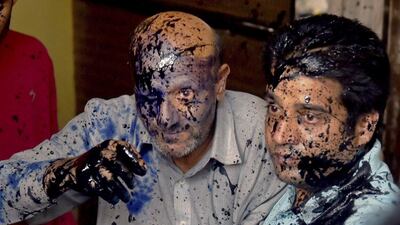NEW DELHI // Ten Shiv Sena party workers were arrested in Mumbai on Monday after they stormed the headquarters of Indian cricket in the latest of a string of violent protests by Hindu nationalists.
The attack was triggered by a meeting scheduled later in the day between the heads of the Indian and Pakistani cricket boards to discuss organising fresh fixtures between the two nations, which have been sporadic since the November 2008 terror attacks in Mumbai.
The cricket officials moved their meeting to New Delhi on Tuesday, while the arrested Shiv Sena members were released on bail of 2,000 rupees (Dh113) each.
The Shiv Sena, a Hindu nationalist party with a power base in Maharashtra, where it is part of the state government along with the Bharatiya Janata Party (BJP), opposes any political or cultural contacts with Pakistan because of its track record of sponsoring terrorism in India.
Earlier this month, the Shiv Sena forced the cancellation of a concert in Mumbai by the Pakistani singer Ghulam Ali. Last week, they threw ink on Sudheendra Kulkarni, a think-tank chairman, just before he was to release a book by the former Pakistani foreign minister Khurshid Mahmud Kasuri.
The Shiv Sena called the attack on Mr Kulkarni a “peaceful protest”. Sanjay Raut, a leader of the party, told reporters at the time: “The ink attack ... is a mild reaction from the Sena. This is not ink but the blood of our soldiers,” referring to Indian armymen who had died in conflicts against Pakistan.
Rajeev Shukla, a senior official of the Board of Control for Cricket in India, lashed out at the Shiv Sena on Twitter after the attack on its office.
“Cricket is a gentleman’s [game] and the spirit of the game expects same generosity and tolerance from those who love the game,” he wrote.
Violent protests by Hindu nationalist – or Hindutva – activists are occurring across India. In the past three days alone, an Australian tourist and a legislator from Jammu and Kashmir have been victims of such belligerence.
In Bengaluru on Saturday, Matt Keith, a visiting Australian, was accosted by a group led by a local BJP leader, who threatened to “skin” Mr Keith for sporting a tattoo of a Hindu goddess on his leg. The police, when appealed to, detained Mr Keith and his girlfriend for several hours before forcing him to write a letter of apology to his tormentors.
On Monday in Delhi, Engineer Rashid, a legislator in Jammu & Kashmir state, was doused with ink and engine oil at the Press Club in New Delhi. A group known as the Hindu Sena claimed the attack.
Mr Rashid had organised a “beef party” in early October to protest against the lynching on September 28 of a Muslim man in Uttar Pradesh state by a mob who accused him of having eaten beef.
Kashmir was under curfew on Monday following the death a day earlier of a 19-year-old who had been in hospital since the truck in which he was travelling was firebombed on October 9 by Hindu activists, angered by reports that a ban on slaughtering cows was being flouted in the region.
In its latest edition, the weekly newspaper Panchajanya, published by the Rashtriya Swayamsevak Sangh (RSS), the biggest Hindutva group in India, defended the lynching in Uttar Pradesh.
"The Vedas order the killing of the sinner who kills a cow," the Panchajanya editorial said. "It is a matter of life and death for many of us."
This spate of violence and hostility has come about because Hindutva groups have begun to feel emboldened, said Sushant K Singh, a New Delhi-based political analyst and a former Indian army officer.
He linked it to the victory of the BJP and prime minister Narendra Modi in the general election last year.
"The electoral results … have been interpreted by sections of BJP supporters to be in favour of a more muscular Hindutva ideology," Mr Singh told The National.
Last Wednesday, Mr Modi spoke about such incidents for the first time.
“Incidents like [the lynching] and the protest against the Pakistani singer [Ghulam Ali] are really sad,” he said, but added that “this has happened in the past too”.
Mr Modi maintained that such incidents fell under the law-and-order purview of state governments, not the federal government.
But Mr Singh pointed out that the federal government “has the power to issue advisories and even act under Article 355 of the Constitution. The prime minister also has a moral and political force by virtue of the post he occupies.”
Article 355 gives the federal government powers to protect states against “internal disturbances” so as to restore law and order. In doing so, the article allows the federal government to overrule state governments, and for this reason it has rarely been used.
“Because these things are happening in the media spotlight while an important [state] election is being fought in Bihar, it has brought more public attention to these issues,” Mr Singh said.
ssubramanian@thenational.ae

